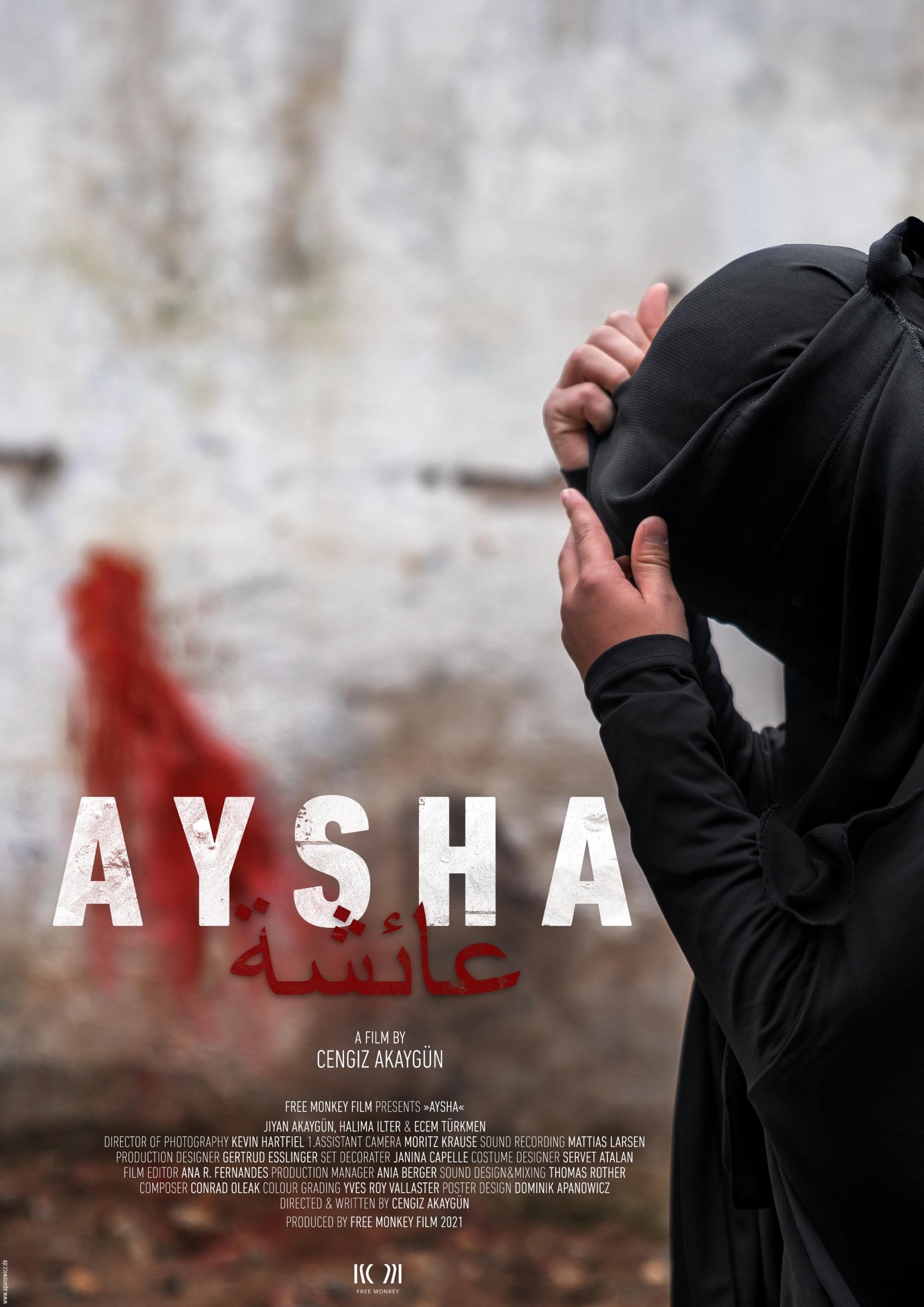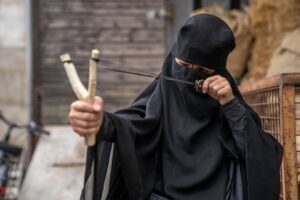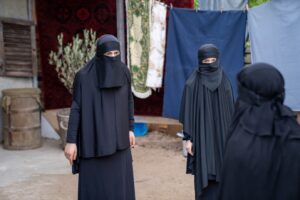
Oscar Qualifying Short Film Review “Aysha”
WATCH THE TRAILER HERE
First, the Recap:
Dissent. Disobedience. Insurgence. Usually associated with civil uprising or, even more unfortunately, all-out war, these terms heralding disorder or social disruption can burn with a fire that is highly difficult to quench once the circumstances they form from are in motion. But, how might the situation unfold when that same sense of incendiary, unchecked unease and bottled-up desire to fight and know ourselves finds itself contained within the soul and mind of innocence? In Rojava, Syria the sounds of conflict rage in the distance, and the back yard of a local home sees a young girl named Aysha (Jiyan Akaygün) and her sister (Ecem Türkmen) being drilled on their retention of religious texts by their mother (Halima Ilter). But, due to recent and devastating events, Aysha soon makes it clear that the intent she harbors within, more than anything else, is ruling her mind–and possibly her actions–releasing anger that threatens to drastically unravel her familial bonds and beliefs while keeping an equally veiled truth from becoming more known.
Next, my Mind:
From the very start of this 13-minute Oscar qualifying short film from writer/director /producer Cengiz Akaygün that offers up an unexpectedly striking opening sequence of a full body veil-wearing girl hurling stones at a blood-stained wall via a slingshot, it leaves no doubt in the viewer’s mind that events to follow will carry some evident volatility and emotionally compromised weight in order to fulfill the film’s intent, and this is assuredly the case. The need for revenge both clashes and melds together with ingrained belief and cultural systems, gender, religious, and societal roles, concepts of courage vs. understandable but still foolish overconfidence, self-identity (pivotal, will just say), built-up rage, and the youthful necessity to rebel against authority all make their presence known through the perspective of a young girl who only wishes to correct a grievous injustice against her family thanks to the unrelenting and merciless tolls of war while hiding a deeper secret in a realm where stringent adherence to unbending rules is paramount.
Yet, the narrative also deeply and effectively chooses to address the grander scope of a child’s impetuous nature, the need to simply react rather than truly think things through, much less accept the actuality of things that cannot be changed, no matter how painful the cost in heart and spirit the given instance of loss, in this case, has caused. What drives so many of the aforementioned points home even more is the realization that, even if not remotely in the same context as is being conveyed here, we all do or have to face those junctures in our lives where logical judgement gets replaced by raw, intense, seemingly unstoppable thirst for nothing but a search for perceived satisfaction in correcting a wrong, spurred on by the anger or other impassioned feelings stirring inside that become the sole force and “voice” we are listening to before something or someone arrives to be the source of reason we need to reassess our purposes, even if we still adamantly resist initially, which gets depicted in this film with unflinching potency.
On an underlying thematic foray, the film offers a lesson in the parent/child dynamic that, in itself, is nothing unheard of, even if taken to a degree of intentionally and jarringly affecting impact here. But what I personally loved is that it does make the argument for the power found in a mother’s devotion to her children, even when they are overtly obstinate, and the ability to diffuse a situation and provide clarity and perhaps the most imperative facet of it all—forgiveness. The visual delivery here is impressive in that the camera focuses so succinctly on key moments and imagery which captures plus deftly defines the overall state of affairs we’re witness to, doing so keenly enough to then allow us to also truly FEEL the gravity of the unfolding reality being encountered by all the characters involved. It makes us aware of just how desperate this family is to escape the horrors of war and the specter of what has personally occurred to them because of it.
Need I once more have to state how continually impressed I remain when it comes to young actors and the often beyond-their-years abilities they bring to the screen? Well, guess what, I AM saying it again thanks to Jiyan Akaygun’s performance in the title role of Aysha, a Syrian girl who finds herself caught between the rigidity and staunch traditionalism, both societally and religiously in particular, of her country and the basic but apparently searingly profound need to throw herself into the current hostilities the nation is confronting. Even as she must attempt to quell the immediate evidence of this need for the sake of trying to maintain appearances for her mother, it all explodes and could spell the tainting or shattering of everything she’s been raised to take hold of as meaningful and arranged for her as a woman and a Muslim. It’s a fully earnest performance Akaygun provides, wholly believable and filled with a mature conviction and energy that undeniably captivates you.
Ilter likewise presents a strongly acted study in illustrating both the doting, unconditional love and the sometimes-needed authoritative side of motherhood through her role as the mother of two sisters whom she has spent time grooming to be the women of their society that’s expected while also taking them through the necessary commitments to learning and memorizing passages from the Quran. But, when she gets to Aysha, the exercise turns decidedly awkward then blatantly turbulent when she’s forced to face a decision Aysha is trying to make that flies in the face of all she’s been taught. Ilter shines through with grounded realism and emotive strength that befits the character perfectly. Finally, Turkman takes on the role of Aysha’s sister, and does so wonderfully, infusing the character with very apropos amounts of commitment to her society, love for her sister, but then the utter shock and disbelief at the behavior Aysha demonstrates as the proceedings carry forward.
So, in total, “Aysha” explores the depths of human emotion and intent to act vs. societal convention and restrictions, the dichotomy between conformity and non-conformity as it applies to personal grief and cultural presuppositions, the currently relevant, ongoing battle for ascertaining who we are and embracing the identity which describes us, and ultimately the acknowledgement of assuming one’s place even in spite of totally rational impulses to seek retribution in the face of a traumatic transgression against us. While we should know with unequivocal confidence that any violence, physically or verbally, is never a true solution, may we at least be willing to learn that it IS ok to take a stand, do it within reason, and manage to find the solace within we’re looking to grasp onto while not losing sight of who we really are and/or are striving to be.
As always, this is all for your consideration and comment. Until next time, thank you for reading!





